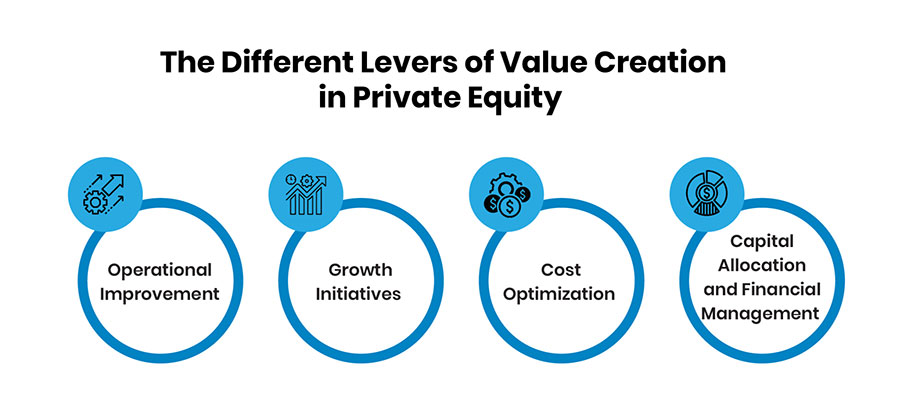Acclimatizing the private equity (PE) value creation playbooks to undetermined economic times is a strategic method that a PE enterprise considers for navigating the fiscal volatility and proceeds in making value for their investments. This transformation consists of altering the traditional values as well as making the strategies reckon for the challenges and opportunities that occur due to the uncertain economic conditions.
What is Value Creation?
Value creation is a fundamental concept of any successful business. It refers to converting resources into something valuable via hard work. In the world of economics, it is termed as the encompassing the creation of tangible products and services. It also describes the process of generating additional value for stakeholders, going beyond the initial investment or input as well as for increasing the overall value of an organization or an investment.
Why is Value Creation Important in Private Equity?
Several investors in the private equity industry usually focus on ‘traditional’ value creation levers, like buying and developing, maximizing efficiencies, geographic expansion, people, and talent. They will also get the possibility to explore a comprehensive set of value levers via the explosion of data available. There is also an enhancement in the competition for assets and a much better availability of unique data sources coupled with advanced analytic tools.
This led to a consequential shift in the accentuation of the PE deals from ‘risk avoidance’ to ‘creating value’. According to the Market Insights Survey, fully 80 percent of responses stated that value creation often or always assists in ranking well in a competitive auction process. Value creation thinking is also happening earlier in the deal process with more sophisticated tooling and diligence for help, whereas value creation specialists are highly influential and play an integral role in deal processes, mainly in the US as well as in the UK private equity markets.
What is the Value Creation Playbook?
The Value Creation Playbook, usually termed to be called the "Playbook," is a strategic framework or set of guidelines that PE firms and investors follow to generate value within their portfolio enterprises. A playbook acts as a roadmap that gives the necessary steps and strategies that are required to maximize a firm’s financial performance, operational efficiency, as well as overall value. It is a dynamic and evolving method, which can be customized to suit the unique ways of each portfolio organization and the objectives of the PE enterprise.
1. The Different Levers of Value Creation in Private Equity
Adding value to a PE portfolio consists of applying strategies that can maximize the financial performance and overall value of the portfolio firms. These levers are not mutually exclusive, and PE firms often employ a combination of these strategies to maximize the private equity playbook. The certain approaches usually change based on the unique characteristics and opportunities of each portfolio organization. There are different crucial levers or strategies that PE firms usually adopt to achieve these:

-
Operational Improvement
Operational improvement is a basic lever for value creation. PE enterprises work closely with the management teams of their portfolio organizations to identify operational inefficiencies and apply the transformations that maximize productivity, decrease costs, and optimize processes. This might consist of streamlining supply chains, enhancing the manufacturing processes, or increasing the distribution channels.
- Growth Initiatives
Expanding and pursuing growth initiatives are another crucial lever. The private equity industry assists the portfolio to maximize to understand the opportunities for revenue growth. This can also mean entering new markets, launching the latest products or services, expanding customer bases, or pursuing strategic acquisitions to get synergies and scale.
- Cost Optimization
Cost optimization is about associating and decreasing unwanted expenses without coming to terms when it is about the quality of products or services. This lever consists of renegotiating supplier contracts, consolidating overlapping functions, and removing waste. Effective cost optimization can exceptionally boost.
- Capital Allocation and Financial Management
The capital allocation is crucial for creating value. PE enterprises work with portfolio organizations to ensure that capital is wisely allocated, whether for investing in growth, debt reduction, working capital management, or capital expenditure. Effective financial management, like enhancing financial reporting and analysis can result in better decision-making and financial health.
2. How To Develop and Implement a Value Creation Plan
To develop and apply a value creation plan a survey has been done. With the gathered analysis and experience across several projects worldwide, it is been understood that to identify the key themes the PE enterprises are required to consider while they are evaluating the enhancement of their private equity playbooks:
- The enterprises are required to dig deeper and visit early for the identification of value levers. The more time passes, the more opportunity present is possible to be bound or limited.
- The enterprises must incorporate both revenue and cost levers in a balanced way to their value creation planning. The data shows that the multiples are notably higher in that balanced philosophy.
- They must also explore an end-to-end range of value levers possible. And also look constantly to codify and case study value levers as they identify them.
- Building the talent and tools to implement advanced analytics and also to ensure more secure quantification of identified value levers.
- It is required to closely with the management and advisors with the specialized knowledge that is present to validate the ultimate underlying investment thesis.
3. Various Challenges and Opportunities of Value Creation
Understanding and addressing the challenges as well as capitalizing on the opportunities are essential for the success of value creation in any business. A few of them are presented below:
-
Economic Uncertainty & Operational Efficiency
The challenge that tops the list is Economic downturns, market volatility, and other macroeconomic aspects can pose crucial challenges to value creation. Recessions and external shocks usually affect revenue, profitability, as well as investor confidence.
However, one of the best opportunities is identifying the inefficiencies and optimizing the processes, which lead to substantial price savings and maximized profitability.
-
Execution Risk & Market Growth
Even with well-designed value-creation strategies, the successful execution of the plans is usually challenging. The inability to effectively execute initiatives can result in value leakage. Shifting or moving into new markets, expanding the customer base, and getting international opportunities can drive revenue growth immensely.
-
Talent Management & Development
Attracting, retaining, and building top talent is a huge challenge, mainly in industries with high competition for skilled professionals. Talent gaps can hinder value creation aspects. Investing in the growth and advancement of a skilled and motivated workforce can contribute to enhanced performance as well as innovation.
Examples of Successful Value Creation in Private Equity
Value creation has established itself in various ways across several industries and sectors. Several companies are looking for innovative methods to generate value for their customers, stakeholders, and shareholders, which ultimately results in the growth of their company. A few essential industries and their value-creation examples are as follows:
-
Information Technology
The Information Technology (IT) sector thrives on constant progress, innovation, and adaptation, incorporating value creation in its purest form. By building cutting-edge software solutions that streamline processes and boost overall productivity. Launching the latest features and updates to achieve the ever-changing customer demands and leveraging data analytics for informed decision-making and personalized user experiences.
-
Retail and E-commerce
Retail and e-commerce are constantly facing great alterations, mainly driven by digitalization and customer-centric approaches. In terms of applying user-friendly online shopping experiences with better interfaces. Using customer data to offer tailored product recommendations. Well-structured supply chain management to enable prompt deliveries and reduce costs.
-
Healthcare & Environment
Healthcare possesses great importance in value creation, as it directly affects the care and overall well-being of the patients. Whereas, in environmental services, the goal is for better sustainable practices that are aligned with the wider goal of preserving the planet. By offering Telehealth services that increase the accessibility to medical consultations. Building innovative medical devices and treatments to enhance patient outcomes. To make affordable healthcare management systems that optimizes better resource allocation. Renewable energy solutions to decrease the carbon footprints. Waste management innovations, like recycling and waste-to-energy technologies. Conservation efforts and eco-friendly product development.
Case Studies: Highlights of Successful Value Creation in Private Equity
The private equity industry is required to collaborate effectively with management teams and founders, to align better with a long-term perspective, and to have the flexibility to adapt to transforming market conditions. A few notable real-time applications of successful value creation in PE are:
-
SunGard Data Systems (Silver Lake Partners, KKR, and Bain Capital)
Silver Lake Partners, KKR, and Bain Capital acquired SunGard Data Systems and actively worked on diversification and expanding the organization’s software and technology services. They also focused on reducing costs and enhancing its competitive position by creating better value-creation strategies. This gives the PE firms to collaborate and achieve greater value creation and also emphasizes the necessity of diversification and expanding product as well as service offerings to adapt to the changing market conditions.
-
Phadia (Cinven)
Cinven – one of the popular PE firms, acquired Phadia is a case that gives a great understanding of the strategic value of product diversification. Phadia is a medical technology organization that specializes in vitro diagnostics, mainly allergy and autoimmune testing. Cinven acquired Phadia from Thermo Fisher Scientific. This resulted in better access to a stable and growing sector, created value through synergies, and mainly achieved a successful exit.
To End With….
While there is no one-size-fits-all approach to value creation playbooks in private equity, being well-versed will offer valuable insights into successful strategies, best practices, competitiveness, and relevance in a changing environment. Flexibility, collaboration, and a long-term perspective are key takeaways for PE firms to create value in their portfolio companies successfully.








